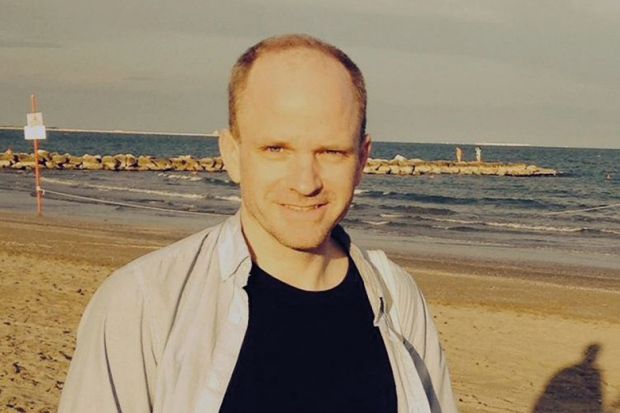John Tresch is a historian of science and technology who has held fellowships at institutions including Columbia University, The University of Chicago, Northwestern University, the Max Planck Institute for the History of Science in Berlin and the Institute for Advanced Study in Princeton. He has also been a visiting researcher at King’s College London and L’École des hautes études en sciences sociales in Paris. His 2012 book, The Romantic Machine: Utopian Science and Technology after Napoleon, won the History of Science Society’s Pfizer Award for an Outstanding Book. This month, he takes up a new professorship in history of art, science and folk practice, funded by the Mellon Foundation, at the University of London’s Warburg Institute.
Where and when were you born?
In Milwaukee, April Fool’s Day, 1972.
How has this shaped you?
It meant a childhood that combined settler romanticism with industrial decline. In summer I worked for the city’s festival grounds, between the lake and the stockyards, emptying bins in a prison-issue orange jumpsuit while representatives of its ethnic groups (at Irish, Italian, Polish and German Fests, African World Festival, Indian Summer and Fiesta Mexicana) drank beer. Milwaukee is one of the US’s most segregated cities but white kids were a minority in my high school – which, thanks to a socialist mayor in the 1920s, looked like an art deco ziggurat with dolphins in the grillwork and marble floors. I think that growing up there encouraged a good-natured scepticism and made it impossible to take too seriously the view from the centre or above.
Where did you do your first degree?
The University of Chicago. There was no football team but you could watch undergraduates terrorising PhD students in seminars, or Trotskyists, Reaganites and queer activists arguing past each other. In my first year, the Romanian mythology scholar Ioan Couliano was assassinated in a bathroom in the divinity school. As John Goodman’s character put it in [the Coen brothers’ 1991 film] Barton Fink, “I’ll show you the life of the mind!”
What was your most memorable moment at university?
An independent study with [anthropologist] George Stocking, talking to him in a tiny alcove of light surrounded by his file cabinets that I assumed contained magic relics from the history of anthropology.
How has it enriched you to have worked in several different countries?
I got a fellowship to Cambridge, where I studied history and philosophy of science. One of my professors told me that Cambridge skipped the 20th century, going straight from a 19th-century village to a globalised network. I spent time in Paris at the École Normale Supérieure, where I was awed by French students’ intellectual tradition, and at L’École des hautes études en sciences sociales, where I saw how institutional arrangements can make it possible to think outside institutions. I returned to the US in 2000 and was struck by the American system’s leagues, ladders and courts; the concentration of power and money in the North-East; and the ambivalent role of the university in critiquing and reproducing the way things are.
Have you ever had a eureka moment?
In my second year at university I remember suddenly getting semiotics: everything can interpret everything else.
Your new professorship is in ‘folk practice’ as well as art and science. What do you understand by this?
The phrase might call to mind maypoles, bagpipes, initiations, The Golden Bough. But there’s another aspect, what [Michael] Polanyi called “tacit knowledge”: although it’s never made explicit, the learning embodied in gestures and habits is the backdrop for any formal system of knowledge – including modern science. So I see “folk practice” as a way to connect traditional objects of anthropology (ritual, tradition, religion) to technology and science.
Have you always been committed to the interdisciplinary ideals of the Warburg Institute?
Yes, but until now my interest in the arts has sometimes felt like just the icing. It’s exciting to work in a place where images and arts are right at the centre of enquiry.
What has changed most in global higher education over the past five to 10 years?
Other than the internet, there’s the insistence on measuring scholarship and teaching by “outputs” and “deliverables”. Although these evaluations are very debatable, I think it’s a good thing to have to communicate the importance of academic work, not least in the humanities.
Should higher education systems in different countries be more willing to learn from each other?
Of course, but it’s never as easy as just importing elements without thinking how they will shift the overall landscape. Much of what seems to be on the rise in the US – astronomical tuition fees, corporate partnerships, the fixation on science, technology, engineering and mathematics – should be challenged, not imported.
If you were the universities minister for a day, what policy would you immediately introduce to the sector?
End fees.
What do you do for fun?
Ride my bike, drink coffee and Monday Madness [when all cinema tickets cost £6] at the Barbican.
Tell us about someone you admire
While writing my book, The Romantic Machine, I learned about François Arago, an astronomer and physicist who supported all the romantic era arts, and after the revolution of 1848 was briefly the head of the French Republic. More recently, I’ve had a new appreciation for Margaret Mead, the anthropologist who fused cybernetics and psychoanalysis with a great faith in method and an active imagination; I think she invented the 1960s by telling people to let their babies do what they wanted.
Do you live by any motto or philosophy?
Maybe “stoic pantheism”.
What would you like to be remembered for?
Inhabiting contradictions with a little grace.
matthew.reisz@timeshighereducation.com
Appointments
Anton Pijpers has been appointed the next president of Utrecht University. The institution’s current vice-president, Professor Pijpers will succeed Marjan Oudeman at the start of October. He studied for his PhD at Utrecht and became a professor at the institution in 1993, before working in industry between 2000 and 2009. He returned to Utrecht in 2009 as dean of the veterinary medicine faculty. Professor Pijpers said that it was a “great privilege” to take on the presidency. “Every day, I am impressed by the talent of the people who work and study here,” he said. “As the executive board, together with the deans, we must ensure that they can flourish and contribute to resolving the social issues facing our world.”
Sharon Marine has been named as The University of Chicago’s vice-president for alumni relations and development. Ms Marine is currently Cornell University’s vice-president for development for the Cornell Tech campus, where she has raised more than $415 million (£318 million) in new gifts and commitments. She started her career at Chicago, as a fundraiser for the Booth School of Business. “The University of Chicago is where I started my career in higher education, so the opportunity to come back is very special,” Ms Marine said. “I am thrilled to rejoin the university in the midst of a fundraising campaign that has achieved incredible momentum and I am excited for the opportunity to help sustain and build on that progress.”
The University of the Highlands and the Islands has appointed three new vice-principals. All are principals of UHI constituent colleges: Stuart Gibb, who becomes vice-principal (international and external engagement), Lydia Rohmer, the new vice-principal (tertiary), and Iain Macmillan, who becomes vice-principal (strategic harmonisation and organisational efficiency).
Three new professors have joined York Management School, at the University of York. They are Carole Howorth, chair in sustainable and ethical entrepreneurship; Victoria Wells, chair in sustainable and ethical management; and Robert McMurray, chair in work and organisation.


